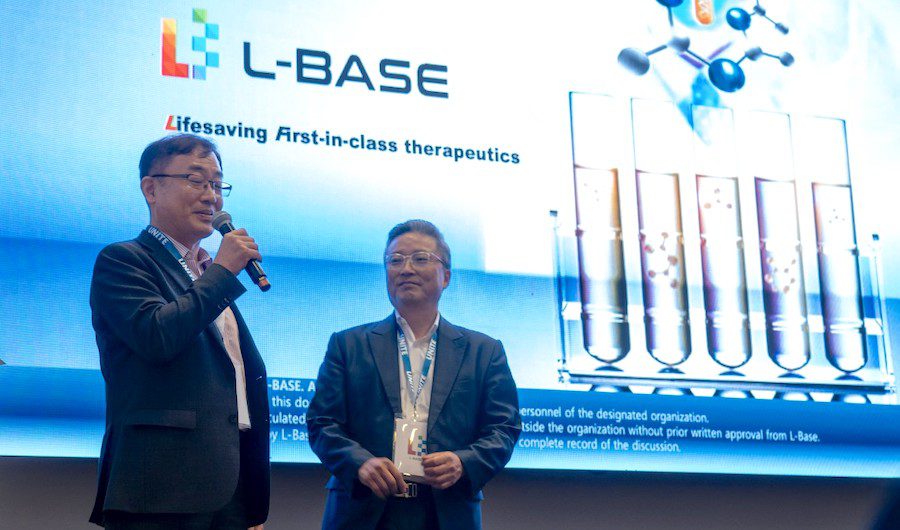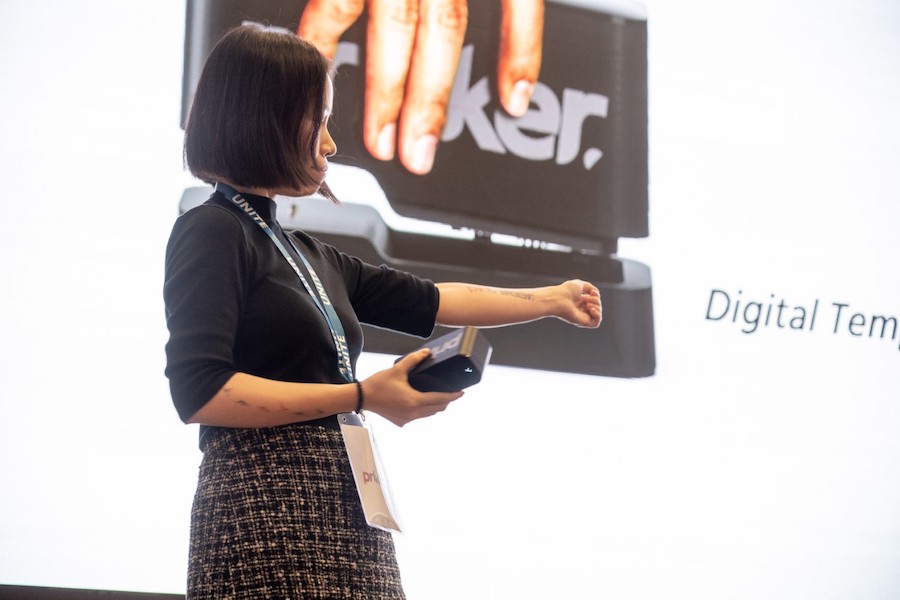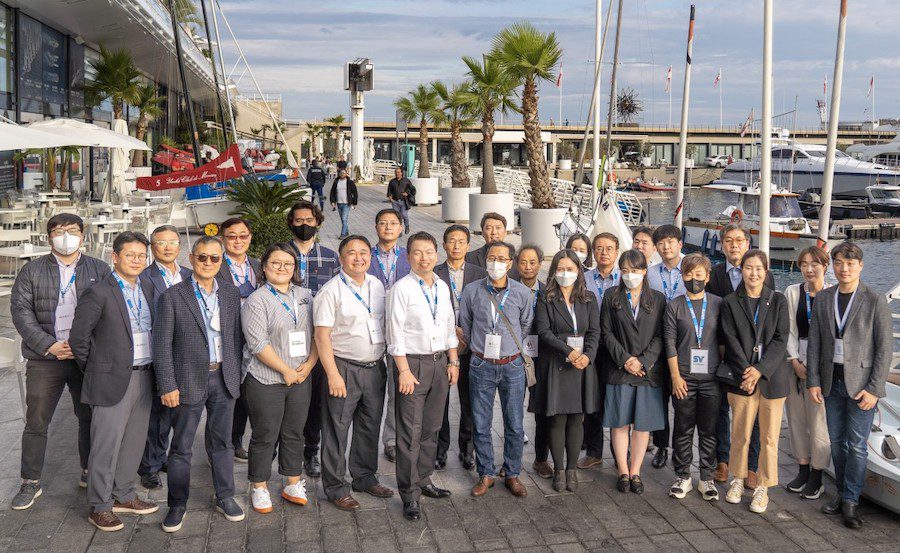This year’s Vroom summit welcomed innovative, global-minded South Korean start-ups and Monaco Life delved in deeper with two of them: L-Base and its novel treatment for lung cancer, and Prinker with its revolutionary temporary tattoos.
The organisers of this year’s Vroom summit partnered up with KISED (Korea Institute of Start-up and Entrepreneurship Development), bringing together innovative South Korean companies with local investors. The aim: to facilitate the insertion of these start-ups into the European market.
Prior to their investment pitches on the first day of the summit, L-Base sat down with Monaco Life to discuss its exciting new cancer drug, which has the potential to completely revolutionise the way that the disease is treated. For Joe Kim, the managing director of L-Base, the desire to pursue this potentially life-saving project was simple: “There are so many lung cancer patients around the world, and in Europe alone there are 320,000 people that suffer every year and 2.2 million globally. Despite this, there aren’t really any effective solutions.”
Lung cancer, and cancers more generally, are lacking in effective treatments. They are often treated with chemotherapy, which, as Mr Kim points out, isn’t necessarily the safest or the most effective treatment: “Chemo is so deadly, people die from it. The problem with the targeted solution is that it causes so many side effects.”
This is where L-Base’s treatment comes to the fore, positing a viable alternative to chemotherapy. It is based on a ground-breaking study by L-Base, which had discovered a cancer associated cell, thereafter known as ‘CAGE’. “It is inhibited in every cancer cell that exists and we found that in 2002,” says Mr Kim. “That was found by our team and it was a revolutionary finding, which later became known to the world.”
This incredible finding laid the groundwork for scientists to develop the drug, which as well as proving effective in in-vitro and animal trials, is also symptom-free. It is this element that renders L-Base’s peptide-based drug such a unique project. “The current, available anti-cancer drugs are very much target-driven solutions, whereas we are more looking into the root cause of the cancer problems…We have produced a drug which provides so few side effects relative to other treatments.”
L-Base has thus far experienced great success in their mission to create a safer, more efficient cancer treatment. However, their journey is about to reach a critical juncture as they prepare for human trials, and L-Base see the Vroom summit as crucial in allowing them to continue on their journey. “The initial stage of the first part of the clinical human study will be done through King’s College in the UK… That will put us into the real cycle of the human trial, which will be in 2022… All the preclinical tests so far indicate that it is going to work.”
To continue on their path, and to bring their life-saving product to the market, L-Base now seeks further financial backing, and they have identified the unique characteristics of local, Monegasque investors that would make them an ideal partner. “We are hoping to raise a fund to help us lead into the human clinical study of our product,” Mr Kim reveals. “We wish to find not just money. I believe that Monaco has very fine investors who can actually invest a good amount, however we are looking for investors who can share our vision, share our tears and our success. For that reason, we don’t believe that institutional investors will do that job at this stage, and we believe that there are more investors like that in Monaco, and Vroom and Whitecastle will help us to find that.”
Any investment would potentially be funding not only a revolutionary advancement in the treatment of lung cancer, but also, as Mr Kim revealed, a treatment for a range of other cancers. “We have other pipelines planned for example blood cancer, breast cancer, and pancreatic cancers… This drug can also apply to colorectal cancer, which currently doesn’t have any remedies, so when we’ve finished with the lung cancer drug, we are going to get ready for preclinical trials for colorectal cancer.”
The Vroom summit could therefore help L-Base bring a whole dossier of life-saving products onto the market, highlighting the crucial relationship that exists between innovative, revolutionary start-ups and passionate investors. Also hoping to benefit from this crucial relationship is Prinker, who is seeking to bring its world-first, temporary tattoo printer into the European market.
Founded in 2015, Prinker has already begun asserting itself on the international stage, having already gained popularity in the US market. Similar to L-Base, Prinker is revolutionary within its own field, providing a temporary option to the traditional tattoo.
The product itself consists of ink cartridges, a skin primer and, most importantly, the electronic device which makes the print itself. The device is linked to the Prinker application, which can be found on Android or IOS stores. From there, users can choose from over 8,000 different designs, which are then automatically downloaded onto the printing device, and by skimming the device over the skin, the tattoo is then printed, and can only be washed off by soap.
According to May Ching, manager of Prinker, the uniqueness of the product opens up the tattooing market to a huge, new demographic. “As a temporary tattoo, you don’t have to worry about the pain, you don’t have to worry about the long-term commitment. No worries, no issues, no pain… Our product is a great alternative for kids and there are also parents and adults, who have always wanted a tattoo, but have always been afraid because of the pain and because of the long-term commitment, and some of us just want to have a change of design every day.”
Indeed, not only does the uniqueness of Prinker’s product resolve the issue of long-term commitment, one of the main reasons which make adults reticent towards the idea of getting a tattoo, but their product also has applications in a business context. “Businesses like event agencies or marketing companies use our solution as a form of activation at their events,” says Mr Ching. “So if I am a company such as Channel and I want my attendees to have the Channel logo on their skin, I can upload my logo onto the app and then print it on users, so it has a lot of different uses and hence the target market is so wide.”
Although their global target market may be vast, this is not the case for their domestic market in South Korea, as one of their co-founders Luke Yun points out: “We are not actually a domestic company, we are based in South Korea, but we are carrying out our business in the US market. More specifically, the Korean market is very conservative about skin expression because getting a tattoo is illegal.”
Given the stringent control that the government still has over skin expression in South Korea, it is a wonder that Prinker’s novel idea was even conceived at all. Mr Yun and his other co-founders had to look globally for inspiration, and delve into the concept of tattooing in order to formulate their idea. “The idea comes from this complex situation because skin expression is very varied across the world, for example we looked at the Amazon tribes. But we really believe tattooing is related to human instinct. We wanted to find a way to serve this instinct.”
Having searched globally for inspiration, they are now hoping to grow globally. Having already penetrated the US market, Prinker is hoping that the Vroom summit is a springboard for growth in Europe. “Europe is somewhere that we are trying to break into. We are already available in European nations through our official online store at prinker.us and we are also available on Amazon, and there are lots of chances where we can expand further into the European region.”
Primed to help startups, such as Prinker and L-Base, to make the most of those ‘chances’ is Whitecastle Partners, the scouting department for the Vroom summit. Soyeh Kim, Whitecastle’s advisor for Asian finance, highlighted difficulties facing South Korean start-ups in Europe. “There are so many good innovative start-ups in Korea, they want to expand their market into Europe, but when it comes to Europe most of the start-ups are struggling.”
Mrs Kim says that technology, and its suitability to the European market, is a key issue facing South Korean start-ups on the continent, but also alludes to the importance of overcoming these issues: “The Korean government is thinking that the future of Korea is start-up, and they think that globalisation will be the key to their success.”
As a result, all start-ups looking to grow in Europe with Whitecastle Partners must exhibit one key characteristic according to Mrs Kim: “We always have to check that they have a global mind and global thinking, or at least planning to. That is our major criteria.”
Vroom Monaco showcases revolutionary South Korean start-ups


